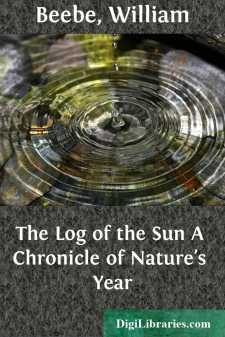Nature
Nature Books
Sort by:
CHAPTER IThe Sound in the Night UPON the moonlit stillness came suddenly a far-off, muffled, crashing sound. Just once it came, then once again the stillness of the wilderness night, the stillness of vast, untraversed solitude. The Boy lifted his eyes and glanced across the thin reek of the camp-fire at Jabe Smith, who sat smoking contemplatively. Answering the glance, the woodsman muttered “old tree...
more...
by:
Royal Dixon
FOREWORD "And in the lion or the frog—In all the life of moor or fen—In ass and peacock, stork and dog,He read similitudes of men." More and more science is being taught in a new way. More and more men are beginning to discard the lumber of the brain's workshop to get at real facts, real conclusions. Laboratories, experiments, tables, classifications are all very vital and all very...
more...
CHAPTER I. PHÆNOMENA OF REVOLVING STORMS. It is the object of the following pages to exhibit, so far as observation may enable us, and in as brief a manner as possible, the connexion, if any, that exists between those terrific meteorological phænomena known as "revolving storms," and those more extensive and occult but not less important phænomena, "atmospheric waves." To the great...
more...
by:
Frederic Houssay
The naturalists of yesterday and the naturalists of to-day. — The study of animals, plants, rocks, and of natural objects generally, was formerly called “natural history”; but this term is tending to disappear from our vocabulary and to give place to the term “natural sciences.” What is the reason of this change, and to what does it correspond? for it is rare for a word to be modified in...
more...
Our Pretty Dragon Flies Come, children; come with me. Come to a pond I know of. See how the water shines in the sun. Over there is an old log lying on the edge of the pond. It is covered with green moss, and a green frog is sitting on one end of it. Let us go and sit on the other end. Goop! he says, and—plump! he has jumped into the water. That is too bad, frog; we did not mean to disturb you. How...
more...
CHAPTER I. The Appalling News. On the advent of Summer, June 1st, the country was horror-stricken by the announcement that a terrible calamity had overtaken the inhabitants of Johnstown, and the neighboring villages. Instantly the whole land was stirred by the startling news of this great disaster. Its appalling magnitude, its dreadful suddenness, its scenes of terror and agony, the fate of thousands...
more...
LET us now, in order to form a clearer conception of the bees' intellectual power, proceed to consider their methods of inter-communication. There can be no doubting that they understand each other; and indeed it were surely impossible for a republic so considerable, wherein the labours are so varied and so marvellously combined, to subsist amid the silence and spiritual isolation of so many...
more...
by:
Jean-Henri Fabre
CHAPTER I: THE BLACK-BELLIED TARANTULA The Spider has a bad name: to most of us, she represents an odious, noxious animal, which every one hastens to crush under foot. Against this summary verdict the observer sets the beast’s industry, its talent as a weaver, its wiliness in the chase, its tragic nuptials and other characteristics of great interest. Yes, the Spider is well worth studying, apart...
more...
Among the manifold operations of living creatures few have more strongly impressed the casual observer or more deeply interested the thoughtful student than the transformations of insects. The schoolboy watches the tiny green caterpillars hatched from eggs laid on a cabbage leaf by the common white butterfly, or maybe rears successfully a batch of silkworms through the changes and chances of their...
more...
by:
William Beebe
BIRDS OF THE SNOW No fact of natural history is more interesting, or more significant of the poetry of evolution, than the distribution of birds over the entire surface of the world. They have overcome countless obstacles, and adapted themselves to all conditions. The last faltering glance which the Arctic explorer sends toward his coveted goal, ere he admits defeat, shows flocks of snow buntings...
more...











